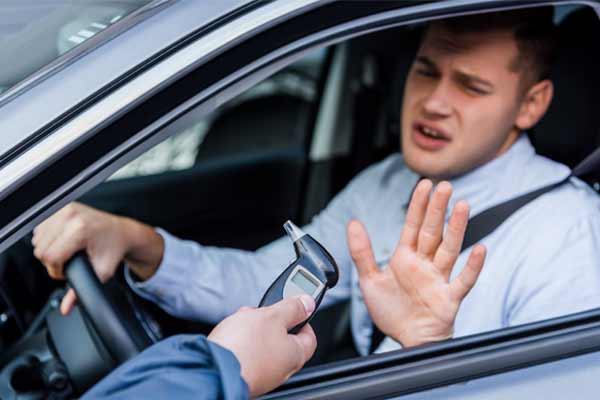Alternative Sentencing Options for Drug Charges in Chicago
2025-04-23T13:15:00
At some point in their driving careers, almost every driver is pulled over. An outstanding majority of the public’s police encounters happen during traffic stops. These stops can range from a minor traffic violation to DUI’s or arrest warrant stops, some of these interactions ending in an arrest. For some people, this may be their first-ever encounter with the police.
Even if you have a perfect driving record, and you’ve never found yourself in trouble with the law, a traffic stop can go wrong very quickly and it’s important to know your rights when you get pulled over. You may find yourself facing fines, losing your license, or facing jail time. In these situations, it is best to call an experienced criminal defense attorney in Chicago, such as the professionals at Ktenas Law.
In the 2014 Heien vs North Carolina case, the US Supreme Court handed down the decision that police officers can stop anyone at any time, for anything, as long as that law enforcement officer reasonably believes that the person they are stopping has, is, or will be committing a crime. In some cases, this also means that the police officer was mistaken, and you have been stopped for doing something that is not a crime. This can lead to unlawful arrests, or unlawful search and seizure.

There are many reasons why an officer can pull you over that are considered legal stops. Illinois law requires all passengers and the driver of each vehicle to be wearing their seatbelts correctly and drivers are prohibited from using handheld devices while the vehicle’s engine is on. Speeding, reckless driving, expired registrations, and a broken tail or headlight make up an overwhelming majority of traffic stops performed in Illinois. Reasonable suspicion that you may be drunk driving or ingesting illegal substances in your vehicle are also legal reasons for a traffic stop.
If you believe you are being signaled to pull over by the police, it is imperative that you remain calm. Turn on your vehicle’s emergency lights, use a blinker to move into the righthand lane if possible, and slow down your vehicle. This makes it clear to the police officers that you are aware that they are attempting to pull you over. You are not required to pull over immediately. As long as you have signaled that you are intending to pull over, you can continue slowly to a well-lit and safe area, where neither yourself nor the police officers will be in any danger of bodily harm from passing cars.
Once you have come to a stop you will need to lower your driver’s side window, turn off your engine, place your hands on the steering wheel, and wait for the officer to come to the window. Make sure to keep your hands visible at all times.
It is legal to record police officers in all 50 states in the United States, including Illinois. If you are planning on recording the officers during your traffic stop, make sure you wait until your engine is turned off before using your handheld device or cell phone.
In most traffic stops, the officer will ask you for your license, registration, and proof of insurance. In Illinois, you are required to give these to the requesting officer in all cases, even if you do not feel that the stop was warranted. It is best to keep all of these documents close to you, or in your glove box, for easy access in case you are stopped.

After running your information, officers may ask you any series of questions, such as “Have you had anything to drink tonight?” Or “Are you aware that you were going over the speed limit?” In these situations, it is always best to remain silent. You are not required to answer any additional questions at all, and in most cases, it is better that you do not answer any questions. Any information you give them can be used against you, whether you are just admitting to speeding or telling the officer that you have illegal substances in your car. The 5th amendment protects your constitutional right to stay silent.
The only questions you are required to answer in the state of Illinois are regarding permitted concealed carry firearms. If you are legally carrying a concealed carry firearm, you must inform the officer upon them asking. If they do not ask, you are not required to inform them.
In many cases, police officers may ask you if they can search your vehicle. Even if you have nothing to hide, your answer should always be “No.” Officers cannot search your vehicle without your permission unless they have a search warrant to do so, you are being arrested, or they have probable cause. They may try to trick you or convince you to allow them to search your car, but your answer should always be “No.” Consent Laws protect your right to deny consent to police officers to search your vehicle.
Probable cause can be hard to understand sometimes, but the officers saying they can “smell” illegal substances, or believe that you have a weapon or illegal substances does not constitute as reasonable suspicion, or probable cause. However, if you have illegal substances or paraphernalia, or weapons in plain sight on your seats and floorboards, this does constitute as probable cause and officers can execute a legal search.
If you refuse a search of your car but officers decide to perform an unreasonable search, this is an illegal search and seizure and no information or evidence gathered during an act of illegal search and seizure can be used against you. Do not attempt to stop the officer, simply remember the date and time, and request the officer’s badge number and name to make a complaint.
The police officer who pulled you over may request that you perform a field sobriety test. Through various investigations and court cases, breath-alcohol and coordination tests were only found to be accurate around 65% of the time. You have the right to refuse a field sobriety test, or a breathalyzer test but should be aware that doing so may lead to your arrest.

While it is your right to refuse a field sobriety test, breathalyzer, or blood test, there can be consequences including license suspension, or even jail time, even if this is your first traffic offense. If you have been pulled over and refused either a breathalyzer test or field sobriety test, reach out to a Chicago DUI defense lawyer immediately for legal assistance to fight any consequences you may face. Even if you refuse testing at the scene, you may be required to submit blood or chemical tests at a later date.
While you may feel as though the police officers are in the wrong, it is important to always stay calm and level-headed during a traffic stop. Raising your voice, yelling at officers, or acting erratically can cause additional problems for you and increase your risk of arrest.
If you are presented with a ticket that you feel is not accurate, you must still sign the ticket. Signing a ticket presented to you by a police officer is not an admittance of guilt, it is an acknowledgment that you are aware of what you are being accused of, and when and where you can fight the ticket in court.
If the police officers who stopped you inform you that you are being arrested, do not panic. Keep calm, listen to all commands from the officers, and stay quiet. Even in custody you are not required to say anything or answer any questions. If officers continue to ask you questions after you have already expressed that you will not be answering questions, inform them that you would like to speak to your attorney.
Do not attempt to flee or fight back. Keep your movements slow and deliberate, body language calm, and obey all orders from the arresting officers. Attempting to run or fight will bring additional charges.
Try to remember as much as you can, including the locations of any cameras that may be watching your arrest, the names and badge numbers of the arresting officers, and any witnesses that may be able to testify in your defense. Legal action can and should be taken against officers who abuse their positions or perform wrongful arrests. All of this information should be passed onto an attorney, such as the criminal defense attorneys at Ktenas Law, who have been representing drivers and providing legal advice in the Chicago area for years, or a government-appointed lawyer, which are available to all residents upon request.

2025-04-23T13:15:00

2025-04-07T11:50:40

2025-03-24T11:55:03

